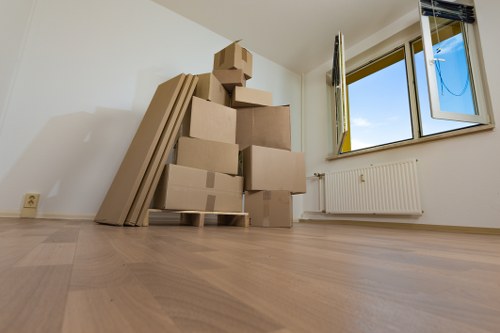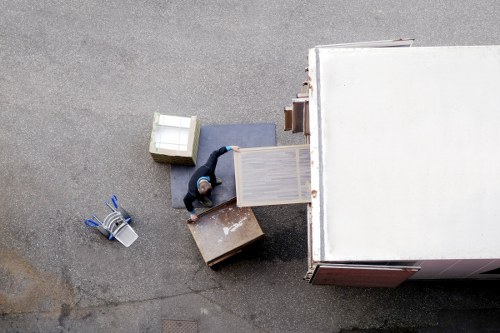White Goods Recycle Watford: Sustainable Solutions for Your Home Appliances

Recycling white goods in Watford is essential for both the environment and the community. White goods, such as refrigerators, washing machines, and dishwashers, are bulky and contain materials that can be harmful if not disposed of properly. By choosing to recycle your old appliances, you contribute to reducing landfill waste and promoting sustainability.
Watford offers several convenient options for recycling white goods. From local recycling centers to specialized collection services, residents have multiple avenues to ensure their old appliances are handled responsibly. Understanding the process and benefits of recycling white goods can help you make informed decisions for your household.
In this article, we will explore the various methods available in Watford for recycling white goods, the benefits of doing so, and provide tips on preparing your appliances for recycling. Additionally, we'll highlight nearby areas where residents can also take advantage of recycling services.
The Importance of Recycling White Goods

Recycling white goods plays a crucial role in environmental conservation. These large appliances contain valuable materials like metals and plastics that can be reprocessed and used to manufacture new products. This not only reduces the need for virgin materials but also minimizes energy consumption and greenhouse gas emissions associated with production.
Moreover, improper disposal of white goods can lead to pollution. Refrigerators and freezers contain refrigerants that can harm the ozone layer if released into the atmosphere. Washing machines and dishwashers often contain hazardous substances that can contaminate soil and water sources.
By recycling your white goods in Watford, you help mitigate these environmental risks. It also supports the local economy by creating jobs in the recycling and manufacturing sectors. Encouraging recycling practices fosters a more sustainable and eco-friendly community.
Benefits of Recycling White Goods in Watford

Choosing to recycle your white goods in Watford comes with numerous benefits:
- Environmental Protection: Reduces landfill waste and prevents pollution.
- Resource Conservation: Conserves natural resources by reusing materials.
- Energy Efficiency: Saves energy compared to producing new materials from scratch.
- Economic Growth: Supports local recycling businesses and job creation.
- Compliance with Regulations: Meets local and national waste disposal regulations.
These benefits highlight the importance of integrating recycling practices into your everyday life in Watford. By taking proactive steps, you contribute to a healthier environment and a stronger community.
How to Recycle White Goods in Watford

Recycling white goods in Watford is a straightforward process. Here are the primary methods available:
- Local Recycling Centers: Watford has several recycling centers where you can drop off your old appliances. These centers are equipped to handle large items and ensure they are processed correctly.
- Specialized Collection Services: Many companies offer door-to-door collection services for white goods. They schedule pickups at your convenience and handle the transportation and recycling process.
- Retailer Take-Back Programs: Some appliance retailers in Watford provide take-back services when you purchase a new appliance. They take responsibility for recycling your old unit.
- Municipal Waste Collection: The local council may offer special waste collection days for bulky items, including white goods. Check the Watford council website for schedules and guidelines.
Choosing the right recycling method depends on your preferences, the size of the appliance, and any specific requirements you may have. Always ensure that the service you choose complies with local recycling regulations.
Preparing Your Appliances for Recycling

Proper preparation of your white goods before recycling ensures a smooth process and maximizes the efficiency of recycling efforts. Follow these steps to prepare your appliances:
- Unplug and Clean: Ensure the appliance is unplugged and clean. Remove any food residue or personal items.
- Drain Liquids: For appliances like washing machines and dishwashers, drain all liquids to prevent spills during transportation.
- Remove Doors and Drawers: If possible, remove doors, drawers, or other detachable parts to make the appliance easier to transport.
- Secure Loose Parts: Use tape or straps to secure any loose parts to prevent damage or injury.
- Check for Recycling Labels: Some appliances have recycling labels indicating the proper disposal method. Follow these guidelines if available.
By taking these preparatory steps, you facilitate the recycling process and ensure that the materials are handled appropriately.
Nearby Areas for White Goods Recycling
Watford is surrounded by several nearby areas that also offer white goods recycling services. Here are some of the closest locations:
- Hemel Hempstead: Located just northwest of Watford, Hemel Hempstead provides multiple recycling centers and collection services for bulky items.
- Harpenden: South of Watford, Harpenden offers specialized recycling facilities that handle a variety of white goods.
- Rickmansworth: East of Watford, Rickmansworth has local initiatives for recycling large appliances efficiently.
- Rickmansworth: East of Watford, Rickmansworth has local initiatives for recycling large appliances efficiently.
- St Albans: Further north, St Albans features comprehensive recycling programs and services for residential and commercial white goods.
- Bushey: Adjacent to Watford, Bushey offers convenient recycling options through local centers and collection services.
- Watford Junction: A key hub, Watford Junction connects to various recycling providers and resources for white goods.
- Watford High Street: Central Watford hosts multiple retailers that participate in take-back programs for old appliances.
- Rickmansworth: East of Watford, Rickmansworth has local initiatives for recycling large appliances efficiently.
- Rickmansworth: East of Watford, Rickmansworth has local initiatives for recycling large appliances efficiently.
- Sandy: To the northeast, Sandy offers additional recycling centers and services catering to larger household items.
- Rickmansworth: East of Watford, Rickmansworth has local initiatives for recycling large appliances efficiently.
These nearby areas provide residents with added flexibility and options for recycling white goods, ensuring that sustainability efforts extend beyond Watford.
Choosing the Right Recycling Service
When selecting a recycling service in Watford, consider the following factors to ensure you are making the best choice:
- Reputation: Look for services with positive reviews and a track record of reliable recycling.
- Certification: Ensure the service is certified to handle and recycle white goods according to environmental standards.
- Convenience: Choose a service that offers flexible pickup times and locations that fit your schedule.
- Cost: Compare pricing among different services to find an affordable option. Some services may offer free recycling for certain appliances.
- Range of Services: Opt for providers that handle a wide range of white goods to avoid dealing with multiple companies.
By carefully evaluating these factors, you can select a recycling service in Watford that meets your needs and supports your commitment to sustainability.
Environmental Impact of Recycling White Goods
Recycling white goods significantly reduces the environmental footprint of household appliances. The process recovers valuable materials, such as steel, aluminum, and plastic, which are then reused in manufacturing new products. This reduces the demand for mining and extraction of raw materials, preserving natural resources.
Additionally, recycling helps lower energy consumption. Producing materials from recycled sources typically requires less energy compared to producing them from scratch. For example, recycling aluminum saves up to 95% of the energy needed to create it from raw materials.
Furthermore, proper recycling prevents the release of harmful substances into the environment. Appliances often contain refrigerants and other chemicals that can damage the ozone layer and contribute to climate change if not properly managed.
Local Regulations and Compliance
Recycling white goods in Watford is governed by local regulations aimed at ensuring environmentally responsible disposal. It is important to comply with these regulations to avoid penalties and support community sustainability goals.
- Waste Electrical and Electronic Equipment (WEEE) Regulations: These regulations mandate that businesses and consumers properly dispose of electronic and electrical equipment. Recycling centers in Watford adhere to these standards to ensure safe handling.
- Landfill Directives: Certain components of white goods are prohibited from being sent to landfills. Recycling facilities are equipped to separate and process these materials accordingly.
- Refrigerant Disposal: Appliances containing refrigerants must have these substances removed before recycling. Certified recycling services in Watford are trained to handle refrigerants safely.
Staying informed about local regulations helps you make responsible recycling choices and contributes to the overall environmental health of Watford.
Tips for Efficient White Goods Recycling
To maximize the efficiency and effectiveness of recycling your white goods, consider the following tips:
- Plan Ahead: Schedule your recycling pickup or drop-off in advance to ensure a smooth process.
- Check Appliance Condition: Ensure your appliance is in a suitable condition for recycling. Some services may refuse items that are excessively damaged.
- Separate Components: If possible, separate recyclable parts from non-recyclable ones to streamline processing.
- Use Certified Services: Always choose recycling services that are certified to handle white goods responsibly.
- Educate Yourself: Stay informed about what materials can be recycled and the proper preparation methods.
Implementing these tips ensures that your white goods are recycled in the most environmentally friendly and efficient manner.
Conclusion
Recycling white goods in Watford is a vital practice for maintaining environmental sustainability and supporting the local community. By utilizing the various recycling options available, preparing your appliances correctly, and adhering to local regulations, you contribute to a greener and healthier Watford.
Whether you choose to visit a local recycling center, use a specialized collection service, or take advantage of retailer programs, every effort counts towards reducing waste and conserving resources. Embrace the benefits of recycling white goods and encourage others in your community to do the same.
Frequently Asked Questions
- What are white goods?
White goods refer to large household appliances such as refrigerators, washing machines, dryers, dishwashers, and ovens. They are typically used for routine home tasks and are characterized by their bulky size.
- How can I recycle my old washing machine in Watford?
You can recycle your old washing machine in Watford by taking it to a local recycling center, scheduling a pickup with a specialized collection service, or utilizing a retailer's take-back program when purchasing a new appliance.
- Are there any costs associated with recycling white goods in Watford?
Costs can vary depending on the recycling method you choose. Some services offer free recycling for certain appliances, while others may charge a fee based on the size and type of the appliance. It's best to check with the specific service provider for detailed pricing information.
- What should I do before recycling my refrigerator?
Before recycling your refrigerator, you should unplug it, remove all food and liquids, drain any refrigerants, and clean the interior. Additionally, removing detachable parts like shelves can make the appliance easier to transport.
- Is recycling white goods better for the environment?
Yes, recycling white goods is significantly better for the environment compared to disposing of them in landfills. Recycling conserves natural resources, reduces energy consumption, and prevents the release of harmful substances into the environment.